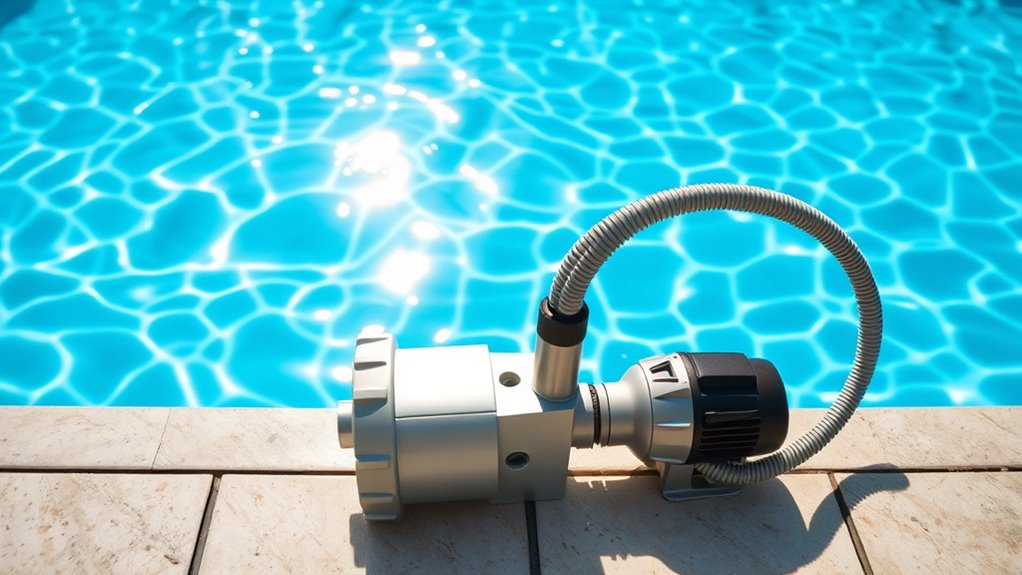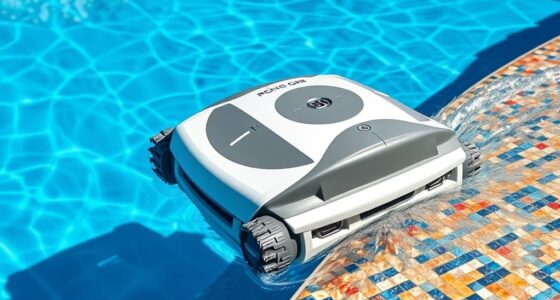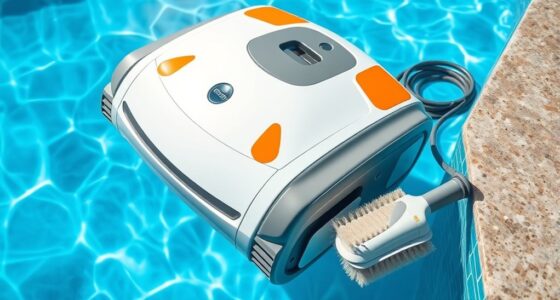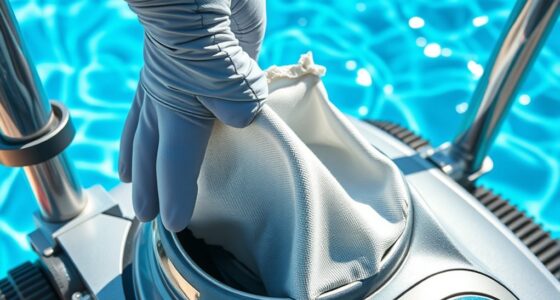The frequency you should run a pressure pool cleaner depends on your pool’s use and environment. For high-traffic pools or during heavy debris times, running it daily helps keep the water clear and surfaces clean. Typically, moderate-use pools only need weekly runs. Factors like weather, nearby trees, and pool size also matter. Staying on top of these needs guarantees a healthy, inviting pool—learn more about optimizing your cleaning schedule below.
Key Takeaways
- Run the pressure pool cleaner daily in high-traffic or heavily used pools to maintain water clarity.
- For moderate-use pools, weekly cleaning is typically sufficient to prevent debris buildup.
- Adjust cleaning frequency based on weather conditions, such as after storms or pollen seasons.
- Increase cleaning frequency during seasons with increased debris or algae growth to keep water balanced.
- Regularly inspect and replace worn parts to ensure optimal cleaner performance with frequent use.
Factors Influencing Cleaning Frequency
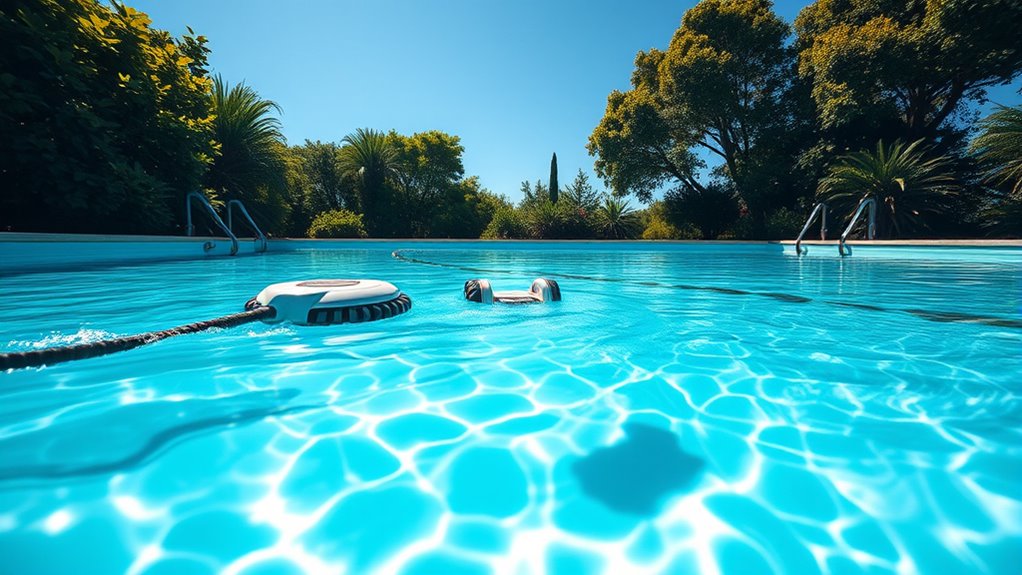
Several factors can influence how often you should run your pressure pool cleaner. One key aspect is chemical balancing; if your pool’s pH and sanitizer levels are off, debris and algae can accumulate faster, requiring more frequent cleaning. Proper chemical balance helps keep the water clear and reduces debris buildup on the pool floor and walls. Pool lighting also plays a role—well-lit pools tend to attract more insects and debris, increasing the frequency of cleaning needed. Additionally, if your pool is in a dusty or heavily wooded area, you’ll need to run the cleaner more often. Monitoring these factors ensures you maintain a clean, safe swimming environment and prevents the need for extensive cleaning later. Regularly checking water quality can help you determine the optimal cleaning schedule and maintain overall pool health. Being aware of pool equipment functionality and potential malfunctions can also influence how often you should run your cleaner, ensuring it operates efficiently. Regular maintenance of pressure pool cleaners can improve their performance and lifespan. Staying aware of cyber threats relevant to pool equipment and security can also protect your system from potential vulnerabilities. Maintaining a consistent cleaning routine can also prolong the lifespan of your pool equipment.
Daily Use in High-Traffic Pools
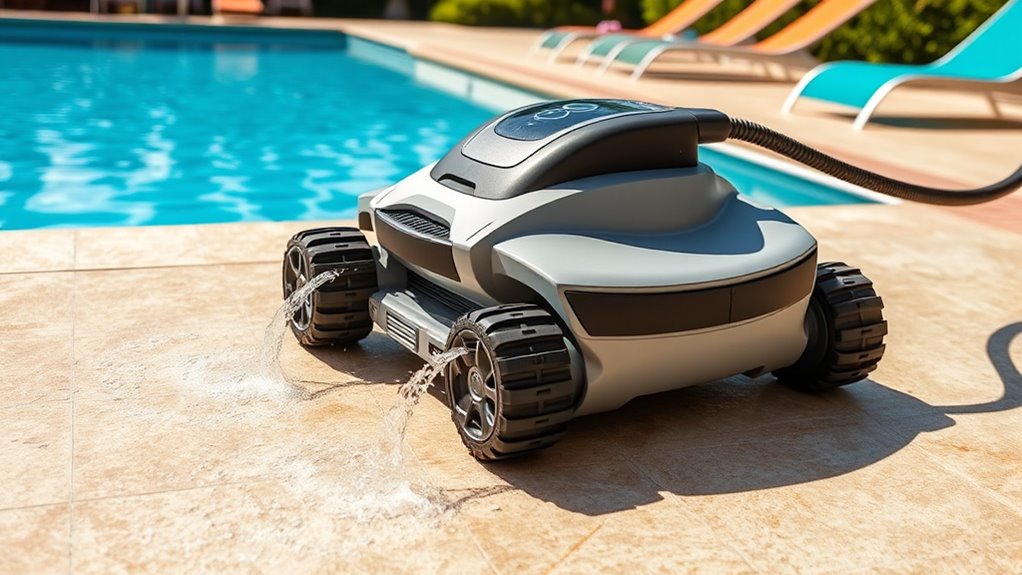
Running your pressure pool cleaner daily in a high-traffic pool helps keep the water clear and reduces debris buildup. However, frequent use can accelerate wear and increase maintenance needs. It’s important to balance cleaning frequency with the long-term health of your equipment. Incorporating automation technologies can further optimize pool maintenance routines and reduce manual effort. Additionally, monitoring the filter system regularly ensures optimal performance and prevents unnecessary strain on your cleaner. Regular inspections can also help detect early signs of equipment wear before major repairs are needed, and implementing preventive maintenance strategies can extend the lifespan of your pool equipment effectively. Being attentive to manufacturer guidelines can also guide you on the ideal cleaning schedule to avoid overusing your pressure cleaner.
Frequent Cleaning Benefits
Because high-traffic pools see more debris and contaminants, using a pressure pool cleaner daily can considerably improve water quality. Frequent cleaning helps maintain proper chemical balance by preventing buildup of dirt and organic matter that can disrupt pH levels and sanitizer effectiveness. It also reduces strain on your filtration system, making filter maintenance easier and less frequent. Regular cleaning ensures the pool remains clear and inviting, minimizing algae growth and cloudiness caused by debris accumulation. By keeping debris under control, you’ll also prevent potential clogging and prolong the life of your pool equipment. Additionally, consistent cleaning supports maintaining a rustic farmhouse bedroom ambience, which emphasizes cleanliness and natural aesthetics. Proper filter maintenance is essential to sustain optimal filtration performance and ensure the water remains crystal clear. Overall, daily use of a pressure cleaner in busy pools supports a healthier, safer swimming environment and reduces the need for extensive chemical adjustments or costly repairs down the line.
Wear and Maintenance
Daily use of a pressure pool cleaner in high-traffic pools can accelerate wear on key components like hoses, bearings, and brushes. To keep your equipment in top shape, regularly check and replace worn parts. Proper chemical balancing prevents algae buildup and reduces strain on the cleaner, extending its lifespan. Additionally, maintaining accurate equipment calibration ensures optimal cleaning performance and prevents unnecessary wear. Clean filters frequently to avoid clogs that can force the cleaner to work harder, leading to faster deterioration. Inspect hoses and bearings for leaks or damage, replacing them as needed. Regularly exploring crochet styles for locs and other protective styling options can also help reduce stress on your pool equipment by minimizing unnecessary strain during cleaning. Staying aware of wear and tear can help you identify issues early before major repairs are needed. Incorporating maintenance routines tailored for high-traffic pools is essential for prolonging your cleaner’s lifespan. Consistent maintenance not only prolongs your cleaner’s life but also guarantees thorough pool cleaning, especially in busy pools where constant use takes a toll. Implementing preventative inspection practices can further identify potential problems before they escalate, saving time and costs.
Weekly Maintenance for Moderate Use
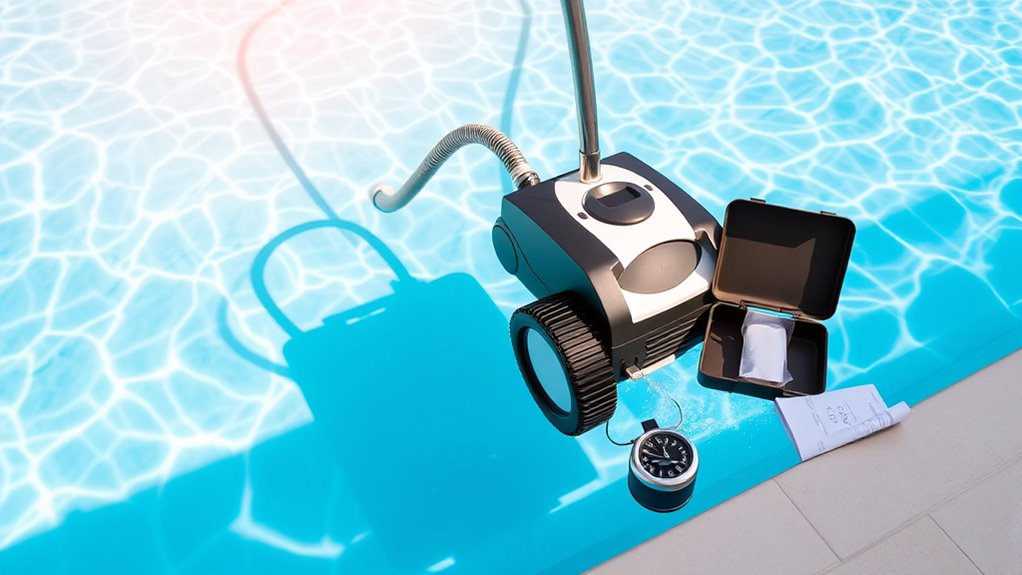
For moderate pool use, scheduling weekly maintenance guarantees your pressure pool cleaner stays efficient. Begin by checking the pool’s chemical balance; maintaining proper pH and sanitizer levels prevents debris buildup that can clog the cleaner. Clear any leaves or debris from the skimmer and pool surface regularly. Additionally, inspect your pump maintenance—ensure the pump basket is clean and the filter is functioning correctly to keep water flowing smoothly. Regularly examine hoses and connections for leaks or wear, replacing parts as needed. Running the cleaner once a week helps prevent algae growth and debris accumulation. Proper pressure pool cleaner operation is essential for optimal performance. Incorporating grocery savings strategies like buying in bulk and using coupons can help offset maintenance costs. Regular maintenance not only prolongs your pressure pool cleaner’s lifespan but also ensures your pool stays clean and clear with minimal effort. Additionally, maintaining proper water chemistry is crucial for effective operation and preventing scale buildup that can impair the cleaner’s function. Consistent filter maintenance and routine cleaning routines are also vital for effective operation. Air quality considerations like maintaining proper filtration and cleaning routines are crucial for effective operation.
Seasonal Adjustments and Weather Considerations
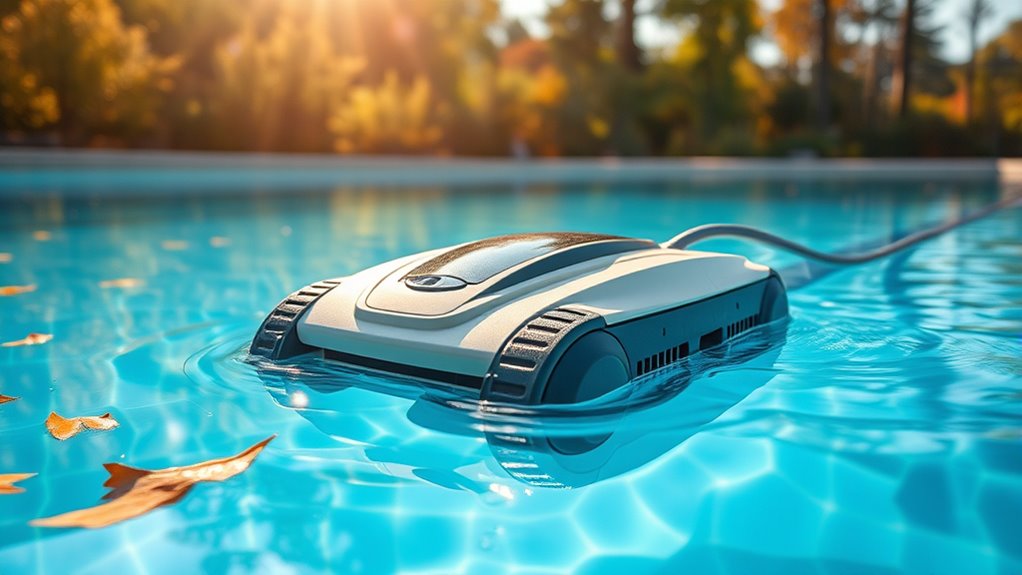
Adjusting your pressure pool cleaner routine to match seasonal changes and weather conditions helps maintain ideal performance year-round. During cooler months, algae growth slows, so you can reduce cleaning frequency. In hot weather, increased debris and algae require more frequent runs. Weather fluctuations impact chemical balance, so regularly test and adjust chemicals to keep water clear and safe. Proper chemical balance also supports pump efficiency, preventing strain on your system.
- Monitor weather forecasts to anticipate debris buildup
- Adjust cleaning frequency based on rainfall or wind
- Maintain optimal chemical levels to support pump performance
- Consider running cleaner more often during peak pollen seasons
Adapting your routine ensures consistent cleaning, protects your equipment, and keeps your pool inviting no matter the season.
Pool Size and Surface Type Impacts
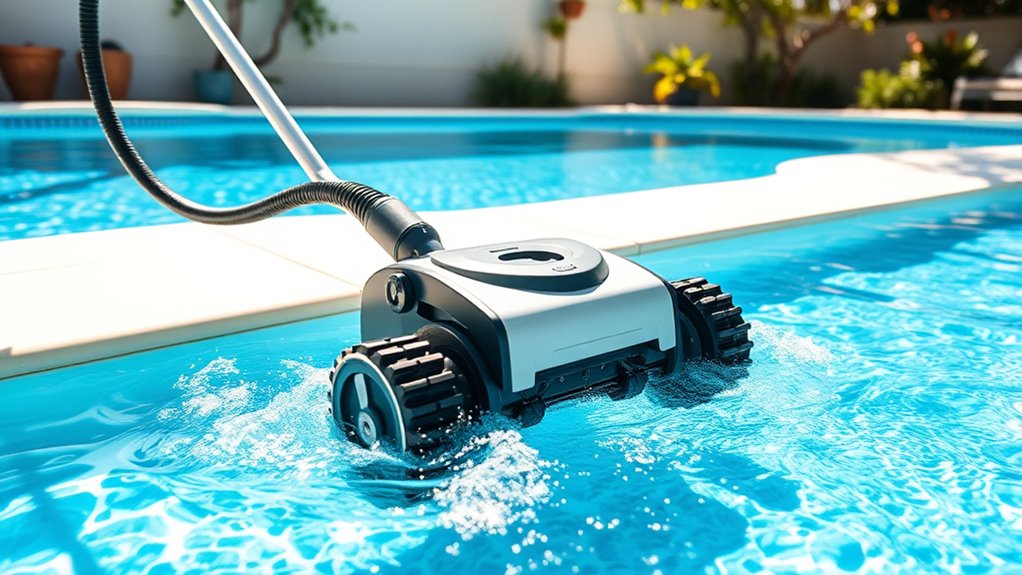
The size of your pool and its surface type directly influence how often you should run your pressure pool cleaner. Larger pools require more frequent cleaning to maintain proper pool chemical balance and prevent algae buildup. Similarly, the surface type—whether plaster, vinyl, or fiberglass—affects debris accumulation and wear. A rougher surface may trap more dirt, demanding more frequent cleaning sessions to keep the water clear. Additionally, if your pool isn’t balanced with the right chemicals, debris can settle faster, reducing pump efficiency. Regular cleaning ensures your pump runs smoothly, saving energy and extending equipment lifespan. Adjust your cleaning schedule based on these factors to keep your pool sparkling and properly maintained, avoiding unnecessary strain on your system.
Environmental Conditions and Debris Levels
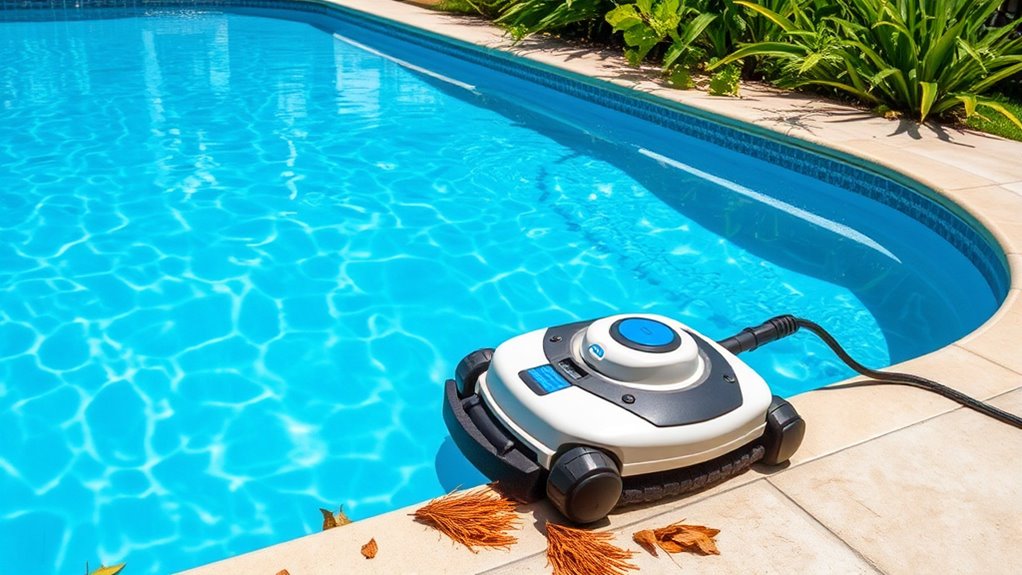
Environmental conditions and debris levels considerably influence how often you should run your pressure pool cleaner. If your pool is exposed to trees, wind, or heavy rain, debris like leaves, dirt, and bugs accumulate quickly, requiring more frequent cleaning. Maintaining proper chemical balance, especially pH and chlorine levels, is essential for algae prevention and keeping the water clear. During peak pollen seasons or after storms, expect to run your cleaner more often to prevent buildup. Regularly check your pool’s surface and water chemistry to determine cleaning needs.
Environmental factors and debris levels determine how often to run your pressure pool cleaner.
Consider these factors:
- Increased organic debris from nearby trees
- Heavy rainfall leading to algae growth
- Imbalanced chemicals affecting algae prevention
- Higher debris levels during windy or stormy weather
Signs That Indicate the Need for Cleaning
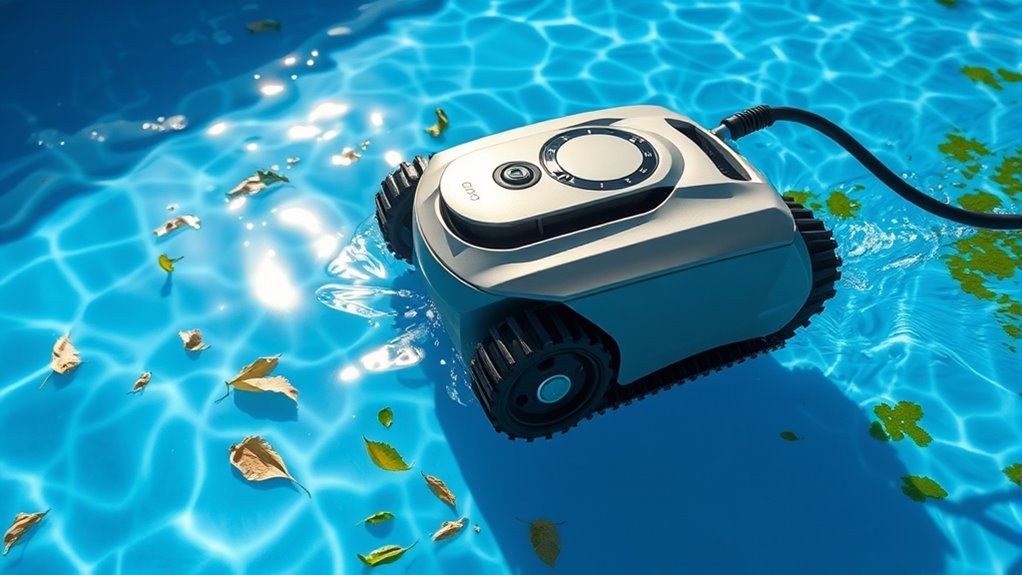
Noticing changes in your pool’s appearance or water quality is a clear sign that it’s time to run your pressure pool cleaner. If the water looks cloudy, murky, or has visible debris, cleaning helps restore clarity and maintain proper chemical balance. An imbalance in chemicals can lead to algae growth and reduce pool safety, making regular cleaning essential. Additionally, if you notice uneven water circulation or the presence of dirt along the pool’s surface or bottom, it’s a cue to run the cleaner. Consistent cleaning prevents buildup that can compromise chemical effectiveness and compromise pool safety. Paying attention to these signs ensures your pool remains inviting, safe, and well-maintained. Regular cleaning keeps both the water quality and your pool’s overall health in check.
Best Practices for Optimal Pool Care
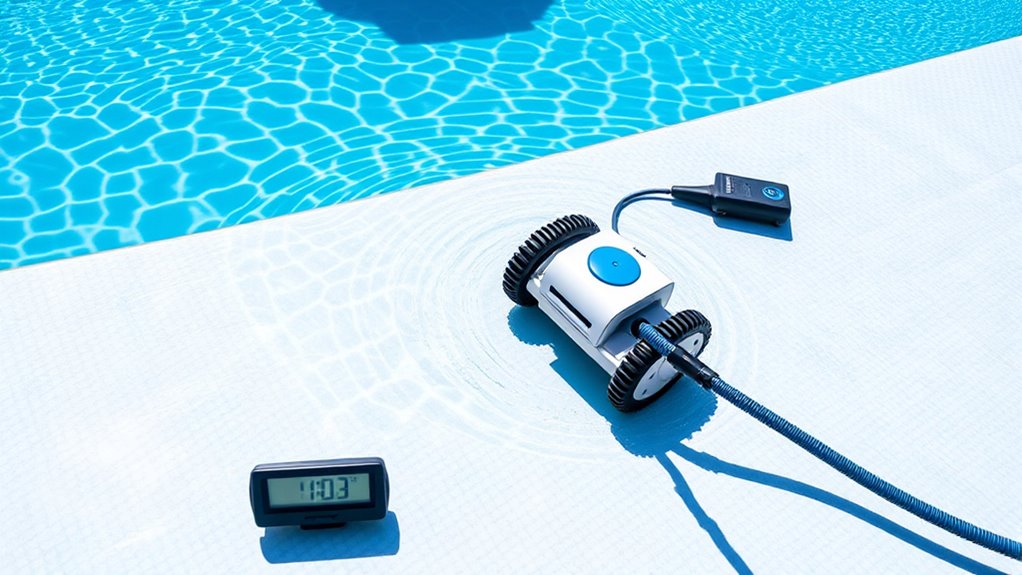
To keep your pool in top condition, adopting best practices for maintenance and care is essential. Regularly check your pool’s chemical balance to prevent algae growth and ensure safe swimming. Maintain proper pH and sanitizer levels to protect your pool liner from damage. Use a pool cover when not in use to minimize debris and chemical imbalance. Additionally, clean your filter system frequently to improve circulation and efficiency.
- Test and adjust pool chemicals weekly
- Regularly brush and vacuum the pool surface
- Protect the pool liner by avoiding harsh chemicals
- Schedule routine professional inspections for long-term care
Following these practices helps extend your pool’s lifespan, ensures a safe swimming environment, and keeps your pressure pool cleaner operating effectively.
Frequently Asked Questions
Can a Pressure Pool Cleaner Be Used During Pool Maintenance or Chemical Treatments?
You can use your pressure pool cleaner during pool maintenance or chemical treatments, but you should verify chemical compatibility first. Make sure the chemicals in your pool won’t damage the equipment or interfere with cleaning. Equipment compatibility is key—wait until chemical levels are balanced and stable before running the cleaner. This prevents damage and ensures your pool stays clean and safe during treatments, extending the life of your cleaner.
How Does Water Temperature Affect the Pressure Pool Cleaner’S Performance?
Imagine the gentle dance of water—your pressure pool cleaner’s performance hinges on this subtle rhythm. When water temperature drops, water flow slows, and cleaner efficiency can wane, making it less effective at removing debris. Warmer water encourages a brisker flow, boosting the cleaner’s performance. Keeping water at ideal temperatures ensures your cleaner operates smoothly, maintaining consistent cleaning power and preserving the pristine condition of your pool.
Is It Safe to Leave a Pressure Pool Cleaner Running Overnight?
Leaving your pressure pool cleaner running overnight isn’t recommended because it can jeopardize pool safety and lead to unnecessary wear on the cleaner. Continuous operation increases the risk of electrical issues or leaks, which could cause hazards. For proper cleaner maintenance, it’s best to run it during the day or when you’re around to monitor it. Always follow manufacturer guidelines to ensure safe, effective cleaning and keep your pool safe for swimmers.
How Often Should Filter Cartridges Be Replaced or Cleaned in Conjunction With the Cleaner?
Imagine your pool’s filter cartridge as its lungs, breathing in debris and dirt. To keep your pool sparkling, follow a regular cleaning schedule—usually every 1-2 weeks during peak season. Replace filter cartridges when they show signs of wear or can’t be thoroughly cleaned. Proper filter cartridge maintenance guarantees your cleaner works efficiently, preventing clogs and keeping your pool clear and inviting.
Are There Specific Brands or Models Recommended for Different Pool Types?
When choosing a pressure pool cleaner, you should consider brands with reliable automatic steering and debris collection features. For inground pools, models like Polaris or Zodiac excel at traversing complex shapes and collecting debris efficiently. For above-ground pools, simpler models from Hayward or Hayward’s AquaNaut series work well. Select a cleaner suited to your pool type, ensuring it has effective automatic navigation and debris collection to keep your pool spotless.
Conclusion
Regularly running your pressure pool cleaner depends on factors like pool size, usage, and debris. For high-traffic pools, daily cleaning keeps your water sparkling, while weekly maintenance suffices for moderate use. Did you know that pools with trees nearby can see debris increase by up to 30% after storms? Keep an eye out for signs like cloudy water or debris buildup, and follow best practices to make certain your pool stays clean and inviting all season long.
